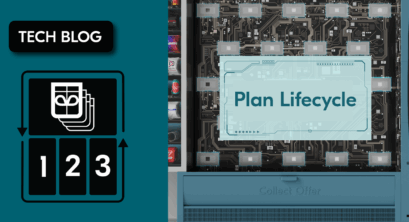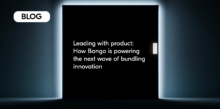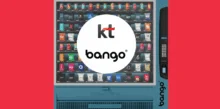How plan lifecycle automation powers subscription bundling
by Cei Sanderson

How Plan lifecycle works
In the subscription lifecycle, at scale since a large Reseller may have millions of customers, management of an offer from start to end date and beyond needs robust automation – and Bango provides it.
- Renewals are tracked in nextRenewalDate fields, processing payments through stored payment methods.
- Managing different dates in a bundle (example: mobile plans renewing on the 1st, streaming services on the 15th) are tracked with TERMINATION_PENDING fields to avoid service ending before the billing cycle does.automation – and Bango provides it.
Offer Orchestration simplifies subscription bundling at source, by making sure services are fully described and the “limits” of each service defined as they relate to each consumer. Resellers define bundles using simple JSON configurations that specify products, pricing, and constraints like Netflix’s regional restrictions. An example:
Offers are checked with a validation process
First, the Digital Vending Machine® (DVMTM) from Bango checks all productKeys exist in the partner’s catalog and ensures pricing aligns with contractual terms offered by the content provider. Invalid offers (such as those outside a regional or with expired dates) are flagged.
Entitlement creation is co-ordinated across services
When a user selects an offer, Bango automates entitlement creation across all services with an API call (POST/v1/entitlement) that creates entitlement records for each product in the bundle. Activation URLs, such as redirections to a consumer’s account, are generated where needed. An example workflow:
- – First, the Reseller sends POST/v1/entitlement with parameters like customerId, productKey, and sharedCustomerId.
- – Second, Bango checks eligibility, creates entitlement records, and returns activation URLs for services requiring user action.
- If the bundle or user is entitled to an upgrade or downgrade (such as a user switching from “HBO Max” to “HBO Basic”) then PATCH /v1/entitlement triggers a plan update without the consumer losing access to the rest of their bundle.
How Plan Lifecycle Automation works
Where Offer Orchestration ensures an offer is valid at its starting point, PLA maintains that smooth customer experience for the complete lifecycle: from creation to renewal to termination. Here are its features.
Lifecycle Management handles access statuses across services
- Resellers can suspend or resume a service without affecting other services in the bundle – meaning (for example) they have the option of pausing a streaming offer during a billing dispute.
- Resellers also enjoy termination options, such as immediate revocation or end-of-cycle cancellation. These are triggered with /v1/entitlement/revoke.
Automation from activation to termination, with redirects
Plan Lifecycle Automation simplifies management of the consumer’s chosen services in the same way as Offer Orchestration does at the outset. These include: ensuring updates are propagated across services as needed, automating redirects for necessary user actions like sign-up or payment validation, all managed through the Reseller’s app or web portal, and more. Within the API the main parts are:
- Automatic payment processing: Bango tracks nextRenewalDate metadata to process payments using stored payment methods.
- Fallback mechanisms on fails: if a payment fails, the entitlement enters a grace period with status SUSPENDED, allowing users to update any details.
- If immediate cancellation is needed, an ACTIVATION_REVOKED notification is triggered across all systems, closing access to mobile and streaming services in one action.
- If normal cancellation is planned (such as a contract ending) TERMINATION_PENDING marks the entitlement as awaiting its end, ensuring services end on the correct billing date.
In the API: resolving integration complexity
Different content providers have different security stances; any API must be capable of dealing with them all. The DVM APIs offer a comprehensive solution.
- Authentication methods vary widely among content providers: some use OAuth 2.0 for security, others use legacy API keys or TLS certificates. The Bango DVM abstracts differences “below the surface” into a standard method in the API, so Resellers can standardize their workflows.
- Data synchronization is needed whenever real-time updates to customer data (such as address changes) are made; the DVM makes sure changes propagate across all services without manual intervention.
- For GDPR Compliance: the DVM maintains anonymization of EU user data “at the DVM level”, ensuring Resellers and Content Providers can comply with regulations as part of their service from Bango.
- PCI-DSS: DVM doesn’t store any payment information in regards to the entitlements or billing plans, with tokenization used in the separate billing and charging capability, removing the need to store individual PII payment data.
Dealing with synchronous and asynchronous workflows
Of course, different processes have different needs for data at different times; the DVM takes account of both synchronous and asynchronous data flows.
- In a Synchronous workflow such as real-time eligibility checks for new users, the DVM can validate data like age and payment method immediately without delays for the consumer.
- In an Asynchronous workflow outcomes depend on outside events, such as a user needing to enter his/her existing Netflix password. This task redirects to the content provider’s own pages, with the Reseller waiting for the user to complete before the Entitlement becomes active.
A further note on security
All standard security measures are part of the DVM Reseller API, including HTTPS and secure API calls. Of course, Bango recommends testing workflows in its sandbox first, from entitlement creation to redirects and termination scenarios.
Standard authentication protocols supported
- OAuth 2.0 (Client Credentials Flow): Resellers use client credentials to access Bango APIs, avoiding sensitive data exposure or the need to store private data.
- Secure API Keys are used for notifications sent from Bango to Resellers, ensuring only authorized endpoints receive updates like ACTIVATION_SUCCESS.
Customer data is protected with GDPR compliance
- All customer metadata and payment information are encrypted at rest with AES-256 and in transit with TLS 1.3.
- GDPR compliance is enforced with automated anonymization for all EU users, simplifying regulatory compliance for all parties.
Conclusion
You see now how the Digital Vending Machine from Bango transforms subscription bundling from a complex technical challenge into an actionable growth strategy for a range of organizations – by centralizing entitlement management with Offer Orchestration, automating lifecycle workflows with Plan Lifecycle Management, and ensuring cross-platform consistency through the standardized identifiers listed above.
This means for the Reseller, an expensive in-house development project becomes far simpler, with defined APIs and easy-to-understand JSON schema. Accordingly, we invite you to explore Bango’s developer portal further:
We’re ready to engage with your team at support@bango.com to grant you sandbox access and begin integrating the DVM into your infrastructure.
Subscribe to our newsletter
Get the latest subscription bundling news and insights delivered straight to your inbox.



